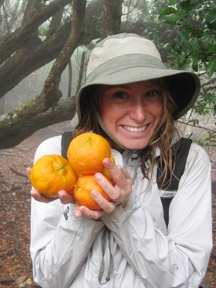Jul 30, 2010

bugsquadtarathiemann
An article in the July 21st edition of Nature asked that very question.
Author Janet Fang, an intern in Nature's Washington, D.C., office, wrote that "Malaria infects some 247 million people worldwide each year, and kills nearly one million. Mosquitoes cause a huge further medical and financial burden by spreading yellow fever, dengue fever, Japanese encephaltis, Rift Valley fever, Chikungunya virus and West Nile virus."
So, how about a world without mosquitoes? "Would anyone or anything miss them?" she asked.
Fang went on to ask scientists that very question. But the fact is, they're here and they're not going anywhere--except over here to bite us.
Meanwhile, over in the UC Davis Department of Entomology, two graduate students just received William Hazelton Memorial Fellowship Awards to further their mosquito research.
Tara Thiemann (top photo), a doctoral candidate studying with major professor William Reisen, received $2100 for her statewide research on bloodfeeding patterns of Culex mosquitoes. She studies both urban and rural populations of mosquitoes and their host meals.
Jenny Carlson (bottom photo), an incoming doctoral student who will be studying with major professor Anthony 'Anton' Cornel, received $2000 for her research on avian malaria parasites.
Thiemann's project involves analyzing the blood meals of Culex mosquitoes to identify specific host species--research important toward understanding both the maintenance and epidemic transmission of the West Nile virus.
bugsquadjennycarlson
The award memorializes William “Bill” Hazeltine (1926-1994), who managed the Lake County Mosquito Abatement District from 1961-64 and the Butte County Mosquito Abatement District from 1966-1992. He was an ardent supporter of the judicious use of public health pesticides to protect public health. He continued work on related projects until his death in 1994.
Hazeltine studied entomology in the UC Berkeley graduate program from 1950-53, and received his doctorate in entomology from Purdue University in 1962.
UC Davis medical entomologist Bruce Eldridge eulogized Hazeltine at the 2005 American Mosquito Control Association conference. His talk, "William Emery Hazelton II--Rebel With a Cause," was later published in the Journal of the American Mosquito Control Association. (See PDF)
It's good to know that Hazeltine's cause lives on through his family's generosity.
Attached Images:

Culex mosquitoes